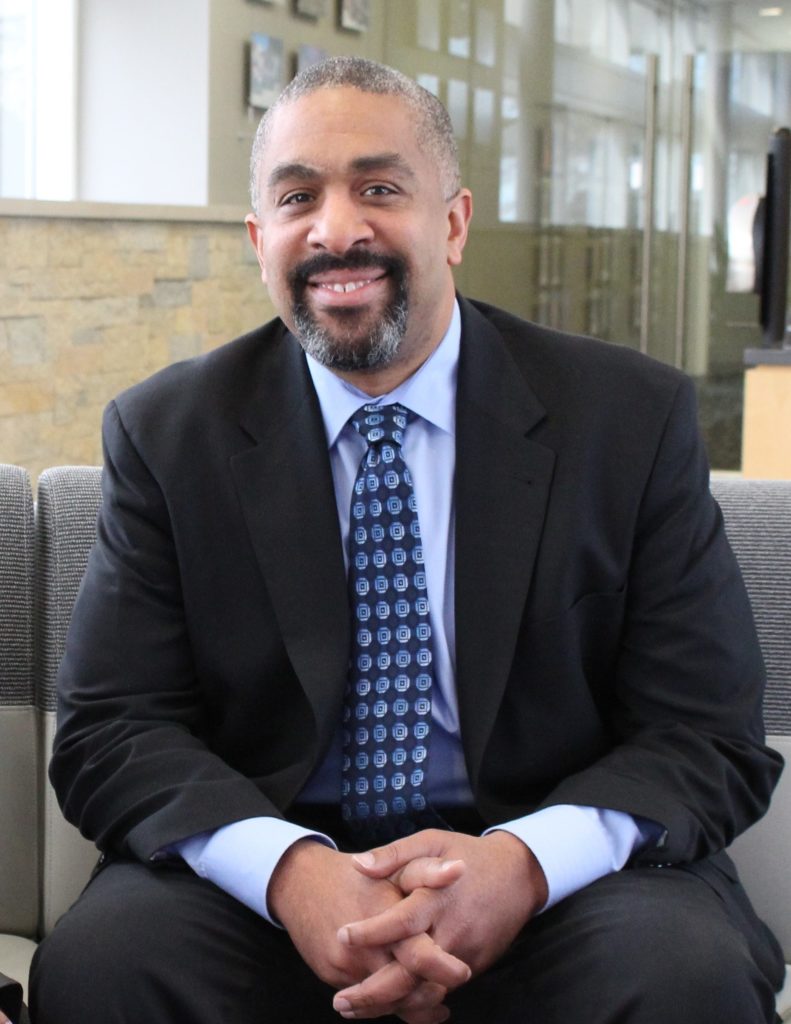
Clyde Tinnen – Partner at Foley and Lardner LLP
Counsel’s Corner – A Conversation with Attorney Clyde Tinnen
Clyde Tinnen is a partner with Foley & Lardner LLP’s Business Law Department and Transactions Practice Group. He holds a JD from Columbia University School of Law and an MBA-Finance from the University of Connecticut-Stamford. Clyde and his wife live in Brookfield, and with three teenage sons, they spend a lot of time watching high school football and basketball. Clyde is a member of the Wisconsin African-American Lawyers Association, the Chicago Black Partners Alliance, and the Jackie Robinson Foundation. He is also Vice Chair of the Milwaukee Urban League’s Board of Directors. In 2019 he was named to the national Business Journal’s Influencers in Law list.
Q: You blazed your own trail on the way to joining the legal profession. Could you share your career path, and how you’ve achieved success?
Clyde – I’ve been practicing law for 14 years, but it’s really my fourth career. I was a youth counselor at a shelter for runaway teens, then I ran after-school programs in New York for two years. I came to Wisconsin for a job with Quad/Graphics to start my six-year printing industry career, and from there moved into corporate finance as a financial analyst with a couple of public companies before going to law school.
So I’d worked for a considerable amount of time before becoming a lawyer. Having that context was helpful, but a larger advantage for me was having comfort in my own skin. I recognized from day one that though senior associates and partners had more experience as a lawyer than me, it didn’t mean that they were smarter or more capable than me. It helped me have the confidence to know what I knew and also be candid to sometimes say “I have no idea what you’re talking about.” Some of my peers were trying to “fake it ‘til you make it” and I don’t think it really served them well. I was happy to be open-minded, stay flexible, do the research, and be a sponge as much as possible.
Q: You’ve published and presented often on diversity in the legal profession. What advice would you give companies for increasing diversity of thought and reducing bias within their teams?
Clyde – I started my legal career at a large firm in New York, and I was one of six African-American men in that class. We came in with a very optimistic outlook. However, much of that optimism was crushed when a highly-respected African-American associate that mentored most of us was passed over for partnership the year we joined the firm. I remember feeling just completely crushed. From our perspective, it seemed like the firm had invested much in him but was not truly vested in him.
One of the things that’s really important is asking the tough “why” questions. Why are the firm’s retention and promotion statistics abysmal for certain categories of attorneys but not for others? Why is diversity important to the firm? At a lot of firms, diversity is in their mission statement, but when pressed about it, a lot of those firms struggle to demonstrate any tangible progress or hold anyone accountable for failing to achieve purportedly mission-critical goals. If firms figure out why diversity and inclusion is important to their businesses, then they can make strategic plans and set measurable, realistic goals to achieve (and hold firm management accountable for achieving such goals). Unfortunately, law firms have been notoriously bad at this. Any diversity and inclusion effort has to be clear on the why, or the what will not matter.
Q: How have you changed since law school?
Clyde – I have different personal and professional priorities today. There’s a paradox of success: When you start and you’re green, anytime someone has a project you run to say yes right away. You’re spending a lot of hours, which the firm appreciates as that is the primary currency that you have to offer, and you get accolades for the time you put in. Now, my value to the firm is not tied just to hours. I do have to work many hours on client matters each year, but my value to the firm is also measured by my relationships and involvement in the community, being a voice in certain matters, being a thought leader on different things. The priorities have shifted so that it’s not all about turning the next document, but achieving each client’s goals and the firm’s goals. It’s no longer enough to be the guy that bills X number of hours, which is both more satisfying and more challenging.
Q: What do you like to do in your small slices of free time?
Clyde – My secret obsession is really bad TV. I love this show right now, 90-Day Fiancé. My kids give me a hard time about watching it, as they should. What draws me to it? I’m fascinated by these terrible shows where people know they’re being filmed and yet they just continue on this path of saying the most outrageous things or making dumb decisions.
Q: As you move ahead in your career and life, what do you want to focus on?
Clyde – I want to serve. What I’m hoping to learn with the rest of the time I have in life is how to mobilize others to multiply the impact of my service.
Right now my mental obsession is how to close the achievement gap. There are a lot of smart people who have and who are investing a lot of time in closing the gap. I’m not arrogant enough to think that I or anyone else can do it alone, but I do believe if enough people put their heads together, they will find a solution and I want to be able to move a lot of people in their direction and resources, as need be. So figuring out how to mobilize people is my goal.
The counseling and community service work that I did early in my career was good work, and it was meaningful, but most of it tended to be one-on-one. With my youngest being a freshman in high school, very soon my kids are not going to need as much from me as they do now. I want to spend time with my wife, and figure out how to spend my time serving the greater Milwaukee area in meaningful ways. Mobilizing people to do big things is what intrigues me.




